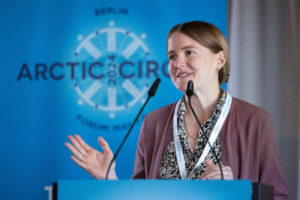How can local perspectives be better taken into account in science and politics against the background of current conflicts in the Arctic regions? IDOS at the Arctic Circle Berlin Forum and at a Parliamentary Evening in the German Bundestag.
„The Arctic at Crossroads. Science – Climate – Policy – Europe“: Under this theme, the Arctic Circle Secretariat, the Federal Ministry of Education and Research and the German Arctic Office at the Alfred Wegener Institute jointly organised the Arctic Circle Berlin Forum (ACBF), which took place on 7 and 8 May 2024 at Radialsystem Berlin. Prominent participants included Ólafur Ragnar Grímsson (President of Iceland, 1996-2016), Prince Albert II of Monaco, Bettina Stark-Watzinger (Federal Minister of Education and Research) and Steffi Lemke (Federal Minister for the Environment, Nature Conservation, Nuclear Safety and Consumer Protection).
In the ACBF-session “Local Actors in Environmental Governance” organised by IDOS and moderated by Dr Christoph Humrich (Assistant Professor at University of Groningen) and Dr Dorothea Wehrmann (Senior Researcher at IDOS), the following experts participated:
- Dr Daniela Sampaio Portella (Alfred-Wegener-Institut, AWI),
- Jacqueline Götze (IDOS, University of Bonn),
- Charlotte Gehrke (Nord University, AWI),
- Arne Riedel, LLM (Ecologic Institute),
- Dr Michael Karcher (AWI) and
- Dr Jakob Schwörer (FES Stockholm).
The participants discussed how local perspectives can be better taken into account in science and politics and how networks can be sustainably established at the local level.
The Arctic has been considered a transnational region for centuries. Using various examples, however, the discussion showed how environmental policies of state actors could be significantly improved by incorporating local and indigenous perspectives in the Arctic regions, thereby also counteracting the impression that resources are being developed at the expense of social and environmental goals.
Also during the Parliamentary Evening „Securitisation of the Arctic? Progressive Strategies on Arctic Politics in the light of Russia’s war in Ukraine“, which took place on 23 April in the German Bundestag, Dr Dorothea Wehrmann emphasised that local perspectives and local conflicts are often disregarded in the development of sustainability policies at national and regional levels. The SUDEA research shows how this reinforces a centre-periphery understanding. The people living in the Arctic regions are increasingly and successfully taking legal action against the inadequate consideration of their interests, as a historic judgement by the Norwegian Supreme Court shows. For Germany as an observer state in the Arctic Council and for the development of the new Arctic guidelines, which are to be adopted by parliament after the summer break, it is particularly important to take this perception of „green colonialism“ into account in order to avoid giving rise to the perception that the „West“ is pursuing a double standard.
Find here more about SUDEA: https://www.idos-research.de/en/research/description/details/sustainable-urban-development-in-the-european-arctic-sudea-towards-enhanced-transnational-cooperation-in-remote-regions/.

